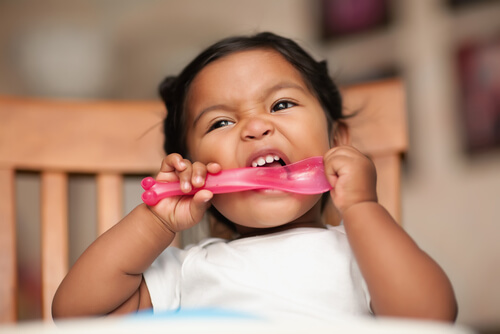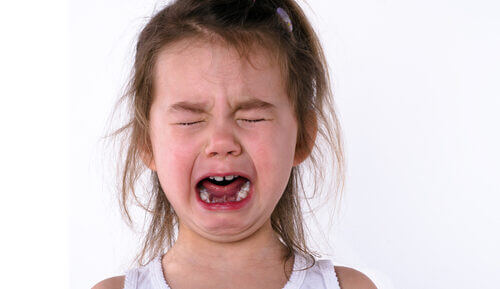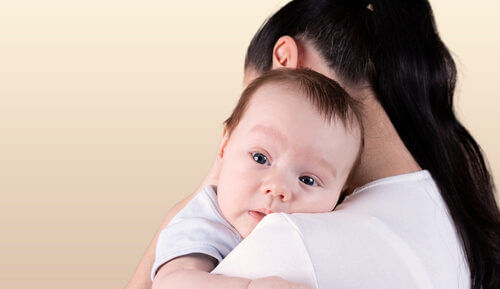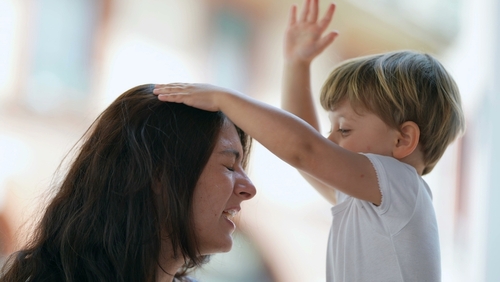
Table of contents
When babies develop into toddlers they also develop various new behaviours. Some behaviours like biting can cause major issues.
Although biting is common behaviour among toddlers, that does not exactly bring any comfort to mums or dads who have to deal with the consequences. However, there are ways to stop the behaviour and understanding why your child has a biting habit will help you to figure out how to deal with it.
If your toddler is a “biter”, they can cause physical and emotional harm to you, siblings and playmates but it can also result in bigger issues. If your child continues to bite, they can get asked to leave by nursery or playgroups which is an awful experience in itself.
Molly-Mae Hague discusses her daughter biting on TikTok
Influencer Molly-Mae Hague told her followers on TikTok recently how her two-year-old Bambi had bitten two children at nursery. She decided not to talk to her daughter about it and said “I feel like, especially in her nursery, they’re all seeing each other doing it and copying the behaviour basically.”
She added: “It’s confusing because if we talk to her about it when we put her in the car, are we giving her the attention that she wants from the biting.”
To help you deal with and manage your child’s behaviour, below are some tips you may find useful if you are unsure of what to do if your child bites you or someone else.
Why do babies bite?
Babies rarely bite to be aggressive.
- Teething: Sore gums from new teeth can make chewing and biting feel soothing.
- Exploration: Babies learn about their environment by putting things in their mouths. This can include fingers, toys, and sometimes other people.
- Cause and effect: Babies are often curious and may just want to see what happens when they bite.
Why do toddlers bite?
Understanding why toddlers bite will enable you to be proactive and prevent possible situations.
Although biting is typical childhood behaviour and something that many toddlers do, the reasons why they do it can vary.
- To show emotion: It is important to remember that young children have limited abilities to communicate and express feelings compared to when they grow older. Much like screaming or crying, biting can be another way your child shows their feelings, such as anger, fear, joy or even love. But even though they understand that it causes pain, they may not yet have the language skills to express their frustration, anger or other strong emotions.
- Seeking attention: Toddlers quickly realise that if they bite another person they will get attention from adults. So this may be a way of them seeking attention.
- Imitation: Young children learn by copying so they may simply be imitating another child.
- Overstimulation: If they are in an environment which is loud and overwhelming they may get stressed and so this can be their response to it.
- Defence mechanism: Children can also use biting as a defence mechanism, particularly if they cannot talk. If your child feels threatened, biting can be a way for them to defend themselves.
How do I stop my toddler from biting?
Before a child understands when they should and should not bite, it is only natural that they test their limits and boundaries. After parents have reacted in such a way that tells the baby it is wrong to bite others, the biting usually stops eventually.
1. Biting tends to be a temporary phase
This makes it a temporary problem in almost all cases, because as your child grows they will develop self-control and new ways to communicate.
2. Let your child know biting is wrong
To prevent a child from biting in the future it is paramount that you try to deal with the issue immediately. Let your child know they have done something wrong but do so in a calm and controlled manner.
When your child bites, teach them they should not do it by calmly but firmly telling them “no, biting is wrong” and to “be gentle” or similar. Use simple words to say it hurts others and if they are in a group of children it is a good idea to first remove them from the situation.
3. Give attention to the victim
Comfort the victim, particularly if it is another child. Giving sympathy to the victim tells your child that biting is not the best way to get your attention. Putting your body between your child and the victim and turning your back on the biter is an effective way to tell your child that biting will not work.
4. Teach your child other ways they could express themselves
Once you have calmed the situation down, try to suggest other ways your child can express themselves and communicate. Again, using simple words such as “no”, “that’s mine” or that they should hug instead of bite to show affection.
If you noticed that your child bit someone to defend themselves, you could teach them to hold up their hand as a stop sign instead.
5. Find the root cause
It may not always be easy to spot at first, but if your child continues to bite even though you have tried numerous methods to make them stop you may be able to see a pattern.
For example, if you have noticed that your child only bites in certain situations you may be able to prevent it. If they only do it when they are tired, try to reduce the amount of daily playtime.
Knowing what triggers your child to bite someone will help you deal with it before it happens.
6. Use distractions to redirect their attention
If your child seems angry or frustrated and you know this can cause them to bite, directing their attention to something positive can be very effective.
7. Take your child away from the situation
Taking your child away from the situation will shift their behaviour and calm them down
8. Encourage and praise good behaviour
If your child is getting your attention from biting they may develop a habit. To avoid this, try to use positive reinforcement as a way to give your child attention instead.
Praise your child for communicating well and maintaining self-control. You can motivate your child to stop biting by giving them some kind of reward each day.
What do I do if the biting continues?
If you struggle to get rid of your child’s habit to bite, there could be many reasons behind this.
- Your child may learn at a different pace compared to others so try to stick with it for a while longer.
- Keep giving your child praise when they communicate in a good way.
- It is important to be consistent and reinforce a no biting environment at all times.
- Try to plan ahead as much as you can. Your child may struggle in large groups and become overwhelmed, which results in biting. Consider smaller settings if this is the case where they are more comfortable.
- Get support and take advice from family, other parents and friends before you seek therapy or counselling.
- Involve your nursery if possible as early years practitioners will be experienced in this and may be able to guide you and give you valuable advice on what to do.
When should you see the doctor about your child biting?
As mentioned above, it is typical for babies and toddlers to bite but this behaviour should normally stop when they turn three or four as their communication skills improve.
If you cannot figure out how to stop your child from biting and it is excessive, is getting worse and becomes a big problem it may be time to contact your child’s GP.
There may be an underlying behavioural issue which your child’s doctor can identify.


